For several years I’ve been writing a biography of VFL /AFL giant, Allan Jeans, whose life as a player and coach spans much of the second half of the twentieth century. It’s sometimes felt like I’m writing a history of footy.
My previous book is ‘1989 The Great Grand Final’ and I did high definition audio interviews with Hawthorn and Geelong players. I’ve thought of making a podcast series with the audio, along the lines of this documentary I made for the Speakola podcast back in 2020.
Interviewees included Dermott Brereton, Gary Ayres, Robert DiPierdomenico, Dean Anderson, Peter Schwab, Chris Wittman, John Kennedy Jr and Chris Langford.
Paid subscribers can read transcript below.
I had my first mindblowing AI moment this week when I put this audio through the transcript maker (Rev.com), which does a reasonable job, but then it asked me if I wanted a summary, and this was just mind blowing. I haven’t changed a letter:
In the second episode of the Speak Ola Podcast, host Tony Wilson discusses the famous "pay the price" speech given by Australian Football Hall of Fame inducted coach, Alan Jeans, during halftime in the 1989 Grand Final. Jeans, who had a successful coaching career spanning 31 years, was known for his charismatic and powerful speeches. The "pay the price" speech, which used the metaphor of a boy buying a pair of shoes, was remembered by many players for its motivational impact. Despite the physical challenges the team faced during the game, Jeans' speech helped them regain their focus and determination. The episode also includes reflections from players who worked with Jeans, highlighting his influence and the respect he commanded.
Thank you AI overlord. I look forward to my enslavement down the track.
1989: The Great Grand Final is out of stock, despite it being Fathers Day and finals time, which is quite depressing. There will be copies available soon(ish), whether I print them myself or whether it’s Hardie Grant. If you think you’d like to buy a copy for $35 plus postage, email me your name. If you’d pay $45 for one signed by Dermott, let me know.
Tony (00:00):
Hello, that is me, Tony Wilson, and welcome to the second episode of the Speakola podcast. Here in Australia, at least some of the restrictions relating to Covid 19 are easing somewhat, and we're about to have a return to AFL football on June the 11th. So I thought to whet the appetite, I might feature a famous AFL speech this week. It's Allan Jeans and his Pay the Price speech, which relates to a pair of shoes, and he gave the speech at halftime in the 1989 Grand Final. And it's a speech that's very dear to my heart in the sense that I've just spent six months writing about the 1989 Grand final for a book called '1989: the Great Grand Final'. To give you some context on Allan Jeans. He's an Australian football Hall of Fame inducted coach who lived between 1933 and 2011.
He actually became a coach at a very young age of just 27, and that was at the St Kilda Football Club where he spent 16 years and he had immediate success in his first season of 1961. He took the Saints to their first final series since 1939, and then just a few years later in 1965, he takes them to a grand final, their first since 1913. And in '66, I mean, that's just a very famous day in St Kilda history. The only day where the Saints got home and won a VFL or AFL premiership.
In 1980, he was appointed at Hawthorn. He'd been out of the game for a couple of years at that point and replaced David Parkin. He was not favoured to get the job -- it looked like Peter Hudson was going to get it, but apparently Jeans was only paid, less than $20,000. And one of the great investments because he went on a winning spree.
The Hawks made the finals in 1982 and then won the the premiership in '83 and played in Grand Finals from 1983 to 1989, seven consecutive grand finals of which they won four and lost three. Jeans himself missed out on the 1988 premiership because he suffered a brain aneurysm at the end of 1987.
And so Alan Joyce coached that flag, and it was in 1989 that Jeans was making his return. He was a man on a mission. He'd twice missed out on back-to-back flags earlier in the decade and was hellbent on making amends in 1989.
It's an incredible record. He coached over a 31 year span with a winning percentage of 62%, coach of the team of the century at St Kilda and six grand finals for three premierships at Hawthorn. And his winning percentage at Hawthorn stands at a staggering 71%. So that's Allan Jeans and his incredible record, but he was an equally incredible person. He spent his working life as a policeman at the Cheltenham Police Station, and he just had such natural skills as a speaker. I had the privilege of hearing Allan Jeans on many occasions, never as a senior player, unfortunately. And he filled the room with his voice and his charisma and his personality. I never got to hear him under the blow torch of a senior match day address, but some of his performances became the stuff of folklore, including the most famous of all the Pay the Price speech in the 1989 Grand final. There's no transcript or audio recording. But in writing the 1989 grand final book, all of the Hawthorn players I spoke to mentioned the speech. And so this is going to be a little audio documentary about a boy, a pair of shoes, and paying the price.
The first voice you'll hear is that of Robert Dipierdomenico, Brownlow medalist, the big Dipper, his own legend reigns large over grand final day 1989, and he shares his memories of Jeans as a speaker:
Robert DiPierdomenico (04:07):
Don't believe that bullshit in the public on a Sunday morning. 'Oh y'know, the boys played well yesterday. It's not my team. Y'know, I can't do anything. I'm just the coach, and 'y'know we were disappointed' and whatever. He never used to throw mud at anyone. But Behind closed doors, fucking shit yourself! He raised his voice at the time. The beauty about Jeansy, and I thought he learned himself as well. He just knew how to handle people. Y'know. He might say to Gary, Buckenara, one of our greats, 'now listen son, we can't win without ya!' Right? Or he might say, with Dermott and I, 'you two pull your bloody finger out!' and he'll get us going in a different way. He'll tell Bucky, he'll say, 'we can't win without you', the cotton wool type, whereas with us, he'd be fucking hitting with a stick and yeah, 'we'll, fucken prove you and wrong!' and that sort of stuff.
Tony (05:03):
Next, it's Dean Anderson, just a kid out of Caulfield Grammar in the late eighties and impressed by the power and presence of his coach.
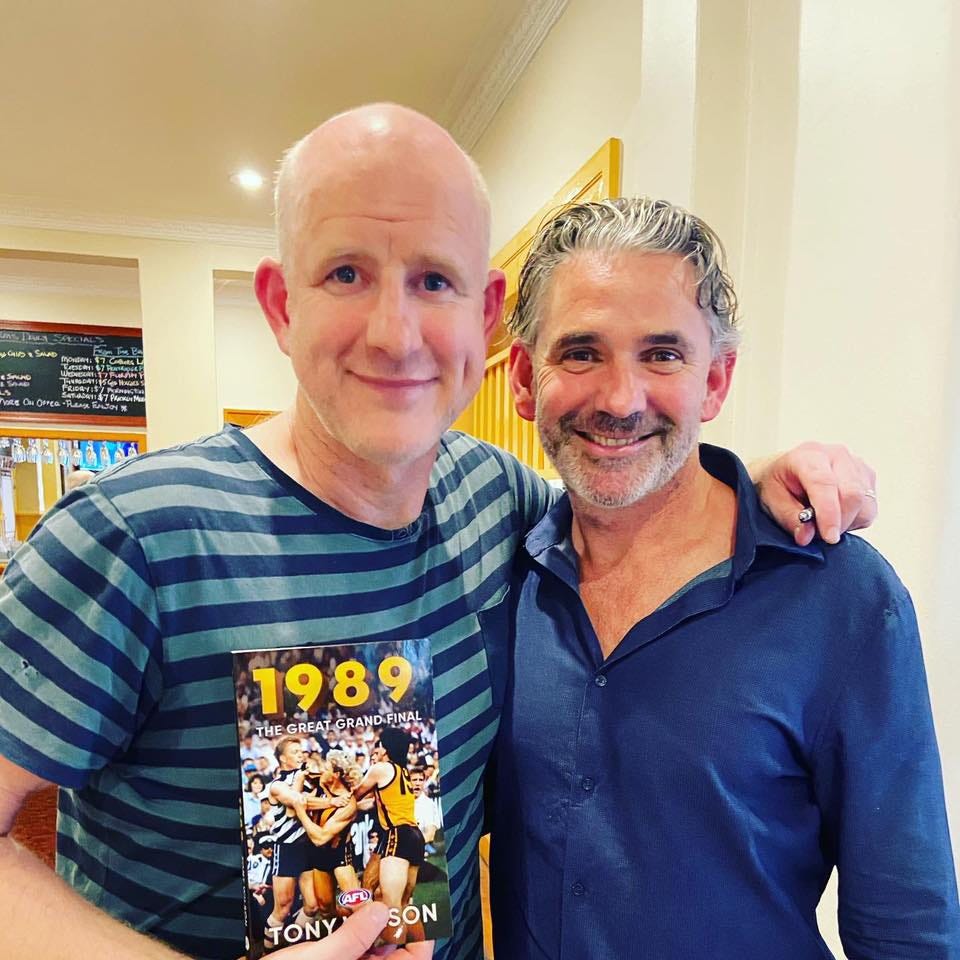
Dean Anderson (05:12):
Oh, he's a great orator. His range was very broad. I remember once going to Russell Greene's, he had a party for his 300th game and Yabby gave the speech and we were having a few cans, carrying on and stuff, and then he just sort of started speaking softly as a speech for Greenie, and then all of a sudden he started roaring. He certainly captured your attention. So very captivating, very influential. And as I said earlier, he's very likeable. So he was certainly a coach that you ... he's a coach that you wanted to play for.
Tony (05:49):
There was no bigger name in eighties footy than Dermott Brereton. Hawthorn's star centre half forward, the hero of 89, and his relationship with Allan Jeans began way back in 1980 as they were both getting started at the club, and he listened to him speak practically every day of the decade that followed.
Dermott Brereton (06:07):
If he had you in the gun and he was yelling at you, he was terrifying. I knew he wasn't going to physically do anything to me, but I was scared of him.
Tony (06:16):
Can you give an example of how he'd do it?
Dermott Brereton (06:18):
He could be cutting in some ways with humour. He could be straight out terrifying ... For a bloke with big ears and no hair on his head, he was a charismatic man. Yeah, you could just picture him in the amphitheatre of the coliseum 2000 years ago, he would've been the bloke standing in the middle of the amphitheatre saying 'the next bout,' and you would've heard a pin drop.
Tony (06:46):
John Kennedy isn't just a famous name in speeches, it's a famous name at Hawthorn, perhaps the most famous name. And John Kennedy Snr's son is John Kennedy Jr, who played in that fateful game. He also delivered Alan Jean's eulogy in 2011.
John Kennedy Jr. (07:02):
He was able to just lower his voice when he had to, and raise it when he needed to, and then move from player to player without saying much. He could just look at you and you'd understand what he's saying or what he's thinking. So he was very good at that. No doubt about it. And he had some difficult individuals to deal with, not necessarily that day, but as a general rule. Some footy clubs, they have very flamboyant individuals, some conservative type players. So he had a whole mix of these individuals that he had to work with and the ones that were out there and pushing the boundaries, I'd almost describe it as a boxing ring. He'd let them push the ropes of the ring out to a certain degree, and if they went over the edge of those rings or fell out the side, he'd certainly pull 'em back into line pretty quickly. But he did allow a bit of flair amongst those players that had that in them.
Tony (07:56):
Defender Peter Schwab missed the 1989 grand final, suspended for the first time in nearly 150 games, a huge disappointment, but he was a Jeans favourite, and he eventually became a senior coach at Hawthorn himself.
Peter Schwab (08:09):
Allan is a great storyteller, but that was one of his great qualities to use metaphor and stories to get a point across, and he had a great way of telling a story. Now, people look at that nowadays and go, oh, that has nothing to do with strategy or systems and all that. Well, no, but it had a lot to do with his ability to inspire and get to the group who he'd had for a long time.
Tony (08:33):
Do you remember any of the stories that he told?
Peter Schwab (08:36):
Oh, he told a lot. He told the boy, just little anecdote, the boy on the mountain, if you see the boy on top of the mountain, he didn't get flown there, he had to climb there. And he'd tell the one of sausages, about footy, the basics of footy. You can fry them, bake them, scramble 'em, curry them, whatever you do. They're still sausages. So he had a little saying for just about everything.
Tony (09:00):
Dual Norm Smith medalist and back pocket Gary Ayres remembers the sausages analogies too.
Gary Ayres (09:06):
Allan had a lot of stories that related to some very fundamentally based philosophies or principles, and the time where he used to say, 'they're just like sausages'. And he could be talking about the presentation, 'and of course you can carry 'em, you can fry 'em, you can boil 'em, but they're still just sausages'. And again, the day he did confuse us was when he said, 'you can also scramble em'. So we just [laughs] but out of respect, you'd never really say too much because you just didn't want to disappoint him. And I think that was a big thing with the way I played with Allan was I just didn't want to disappoint him with a bad performance.
Tony (09:45):
Dermott explained some of the rationale for this.
Dermott Brereton (09:48):
Jeansy had these little fable he used to talk about, he'd say, 'every week, I've got to say the same thing. The difficulty for me is to package up the comment differently so that I keep your attention and you absorb what I'm saying'. Each and every week, it's the same message!
Tony (10:06):
Chris Langford was the team's legendary full back, a 300 game Team of the Century defender, who was tasked with stopping a rampaging Gary Ablett on Grand final day, 1989.
Chris Langford (10:17):
There were three or four of us over the years who would be in the rooms and you'd be looking at the whiteboard, or the chalkboard, or whatever, and then you'd quickly glance to the right, the left, whatever. You'd see them, they're looking at you, and yes, you quickly look away, otherwise you're going to break out laughing. He would butcher metaphors, and the English language would be in tatters, and he'd come along with all sorts of ideas. 'I was watching the tennis last night, and Wimbledon and the tennis players do this ... You can't do that in football!' So he'd always come up with a little story about tennis or dinosaurs or the crossroads and the sign, whether it was the shoes or whatever it was, but some blokes, they'd be eyes on stalks, they'd just be loving it, they'd love that rah rah sort of pep talk and so on. And some of us would be slightly tongue in cheek with a bit of a wry smile. Try not to break out laughing. But either which way, it was all good and he was a good motivator. And at the end of it, he'd go round the block with this funny storytelling metaphor, and then he'd come back to footy. And the punchline was always a ripper.
Tony (11:18):
Here's John Kennedy again.
John Kennedy Jr. (11:20):
It's sometimes hard, even in the most serious situations, to keep a straight face when Al made a mistake, when Jeansy made a bit of a blue -- but it was a wet day and we weren't going so well. And he sort of made the comment that if you don't change your ways in the wet, it's like an animal. You become distinct. And he meant to say extinct. You wouldn't want to look sideways because someone, ... we've all picked it up, but no one says anything, they all keep their heads down.
Tony (11:51):
This is Peter Schwab again, on his rare ability to balance criticism and humour.
Peter Schwab (11:57):
So Yabby had that great ability to sort of tell you stuff and it'd get out because you actually deep down thought it was funny. One is a second semi, playing North Melbourne in 83, when I'm hoping that if I play well and we win, I'm in a grand final, first grand final. So that's a great moment in your life. So I'm a bit nervous and I'm thinking,' oh, just got to play well, got to play well'. So just before we go down the race to get on the ground, he goes to me, calls me over, and I think, 'oh, here's going to be a last minute word of wisdom'. And he looks at me and he goes, [Jeans voice] 'listen, get it into your head. You're not a real good player.' [laughs]
But it's good psychology because my attitude was, 'I'll prove you wrong, I'll show you'. But you'd have the phone calls every Friday night and one night it was North Melbourne again, rings me up, talking away, and then he goes, 'I've got a job for you.' I said, 'oh yeah,' [Jeans impression] 'I don't think you can do it.' [laughs] So I go, 'yeah, what is it?' 'I need you to play on Wayne Schimmelbush. He's a real good player. You're not that good. [laugh] I don't care if you don't get a kick as long as he doesn't get a kick'. So we play North and they beat us and Schimmelbush cuts me up, he could play. So I think he kicked three and had about 30. And Yabby goes, 'oh, son'. He said, 'you couldn't do the job.' I said, 'well, you said it'd be a hard job.' 'I know! I didn't think it'd be that hard!' And then I was a bit smart, and I said, 'oh, listen, I kept one end of the bargain up Yab.' And he goes, 'what's that?' And I said, 'you know how you said it didn't matter if I didn't get a kick?' He goes, 'eeeerrrr yeah!'
Tony (13:29):
Which brings us to the 1989 Grand Final itself. I've immersed myself in this game for six months writing the book, and it's an absolute classic. It has brutality, brilliance, a constant flow of goals, controversy, elegance, skill, violence, passion. But here we're focusing on one speech. At halftime. Hawthorn had a comfortable lead, 36 points. But all was not well. Many of its star players were hurt. It had been a brutal and tiring contest as John Kennedy explains:
John Kennedy Jr. (14:01):
Certainly in halftime when a lot of the heads were down, because we were in a bit of strife in terms of the injuries. We're thinking, 'well, how are we going to keep going with this?' Because we were pretty exhausted. We'd run pretty hard, and we got to halftime and we were up, I think with a good lead, but we had a few injuries and the concern was whether we can get these blokes through, for the rest of the game. And so the shoes one was just something that, I dunno, Yabby just pulled it out of that period of time, and it was the way he presented more than anything else. The way he presented it and his ability to raise and lower his voice, which made the difference in the speech. It doesn't sound like much when you just talk about it as a pair of shoes, and the lady didn't want to pay the price, y'know? But when he told it, it was told with the crescendo when it needed to be, and in his quiet tones when alternatively. So it had an impact because we went out and we were sort of raring to go again. It was almost like we were going out in the first quarter again. He got us back to where we should have been, and that was that we've, we can win this game!
Tony (15:05):
Dipper liked to sit at the front for a Yabby address, just so that the coach knew that he was there, keen and ready to go. But on this occasion he was in trouble. An Ablett collision meant that he'd broken a rib and punctured a lung, a pneumothorax it's called. And adding to his medical woes was the fact that air was leaking from his lung called a subcutaneous emphysema, which meant that Dipper was a long way from feeling a hundred percent. He hid at the back of the room not wanting his coach to know that he was feeling weak.
Robert DiPierdomenico (15:32):
What I remember about the speech was the fact that the way that Yabby said about it, because I wasn't all there, but I still remember thinking, 'what's he fucking going on about here?' Because I've never heard of it before. A boy goes to buy a pair of shoes for a wedding and I'm going, 'does he fucking know where we are at? Is his brain haemorrhage coming out?
Tony (15:52):
Gary Ayres, was on a similar wavelength,
Gary Ayres (15:54):
And we're all thinking maybe he's got his brain aneurysm back. He's telling us on grand final day, we're going to go out and hopefully win back to back premierships. That this kid who goes in who's going to buy a pair of shoes.
Tony (16:05):
Dermott's famous for his Jeans impressions, and he explains the Pay the Price story as well as any. Dermott says it was an allegory born of the coach's own childhood in the small country town of Finley, New South Wales, around the time of World War II. [Jeans is actually from Tocumwal in Victoria]
Dermott Brereton (16:19):
Out came the story of the boy, himself, who saved up his money to get the best pair of shoes for a young boy that he was living in the country. And when he got to the shop, he decided to go for the cheaper pair of shoes and pocket some of the rest of the money he'd saved. And he said several months later, the shoes, the soles started falling off and he said he wished he had have paid the right price. He said, 'you've got to pay the price today'. As I said, he was very charismatic and the way he was able to forcefully deliver that, I mean, we were looking at him and the veins are bulging in his neck and the projection of the voice. And you think of this bloke had an aneurysm twelve months ago almost to the day, but you were looking at him thinking, 'God, this is everything to him, this is serious'.
Tony (17:10):
But the wonderful thing about the parable, is that normally, I mean, the point is magnificent, but really who cares if your shoes ran out a little bit earlier.
Dermott Brereton (17:19):
This is where you are the product of a different era. So you and I just go and buy a new pair, whereas Jeansy living in Finley, that pair of shoes he wore every day, there was no other pair of shoes in the closet. That was the only shoes he had for the entire day.
Tony (17:35):
But John Kennedy Jr. Isn't so sure that Jeans with the little boy in the story.
John Kennedy Jr. (17:39):
No, no, no. It was a lady who had a young boy. He wanted the expensive pair, y'know, the really nice pair, but she didn't want to pay that. She wanted to give him the shit pair. It would only last a year and she'd be going to buy another pair the year after . Whereas if she had've got the really good pair the kid had wanted, would've probably lasted five years. So if she 'd paid the price, he would've got the nice pair and everyone would've been happy, except .... It's a ridiculous story when you think about it, but it's just the way he ... it's silly, isn't it when you think about it. But the way he presented it, y'know that we had to pay the price today, because there was no tomorrow.
Tony (18:10):
But whatever the merits of the shoe story, what everyone agrees on is that it was Jeans's manner that was his genius -- that he had projection, volume, variation, the rule of threes, amplification, crescendo, so many of the attributes of what makes a good and compelling speaker, that he just had it when it came to presence and delivery. This is spare parts small man, Chris Wittman, who had to step up in the absence of John Platten and play an important midfield role:
Chris Wittman (18:40):
Powerful story, but it's also the way Jeansy with his baritoned and his voice. Jeansy was trying to change it up to get us motivated. So he was always looking for new ways, new stories, and it wasn't so much the story for me that resonated. It was his voice, it was his baritones that were so vivid and so powerful.
Tony (18:58):
Here's Gary Ayres.
Gary Ayres (19:00):
To me, the way Yab could get us really motivated. I remember that day I was crying tears streaming down my eyes as I'm walking down the race because it was just such a motivating factor. And footy is emotional, and here you are, you're a grown man, and of course you've got tears streaming down your eyes because Yab could just fire you up with this amazing voice and he could bring you up to a level and then he would just trail off with his voice and it was just like you wanted more and more and more. And I remember the first night that he spoke at the social club back in Glenferrie, and I then knew that I wanted to play for this guy. I wanted to play as much footy under him as I could. And that for me as a young boy was so motivating to have someone like him there.
Dermott Brereton (19:51):
You've got a chance right now to pay the price at the right time. Don't go through the rest of your life wishing that you had have paid the right price here today.
Chris Langford (20:02):
Halftime. Pay the price, the shoes. Yeah, it was a good one. It was a good one, but the way he told it, his passion, he fair dinkum blew a foofer valve. He just went nuts. He went nuts. As I said, the start of the game, he was absolutely obsessed 'back to back. This is it. Third time, lucky, you've got to do it.' It had been going on all year and it just basically reached its crescendo before the game. This is it, right? We're ready to go. And on the other hand, most of the time we're told before the game, don't get over the top. Just keep your emotions in check. Don't get excited. Your performance will decline if you get too excited and too hyped. So we're telling ourselves, 'keep it calm, keep it calm' and Yabby is out there, and he went nuts at halftime. And I remember I was standing not far from, I think next to Peter Curran, and it was literally just as we're about to go out and, 'pay the price, pay the price' and he said it six times and then he said it another six times and then he's still going. And every time he says that he's getting more and more elevated with his emotions and his noise and his veins are bulging out of his neck and his forehead. And I'm thinking 'seriously, Pete get ready to catch him. He's about to have a stroke, he's about to cark it.' I've never seen anyone that animated that emotional, that angry, that loud, anywhere, anytime. And it just kept going up and up and up and up. The dial was beyond the red. It was just unbelievable. So you sort of think, 'okay, well, you've said it. That's enough. That's enough. Calm down.' It was like he was going to go. So it wasn't just like a good rev up talk. It wasn't just like a big halftime tirade. It was not even next level. It was several levels above next level. It was ... memorable. And I'm sure everyone would say the same thing.
Tony (21:55):
So do you reckon he overcooked it? It was slightly counterproductive.
Chris Langford (21:59):
No, I don't think he overcooked it. We needed it ... physically it wasn't going to make any difference. It was about us just absolutely going to war for that last bit.
Tony (22:09):
Here's half forward Dean Anderson, again. The man who kicked Hawthorn's 21st and last goal in the 1989 grand final.
Dean Anderson (22:17):
30 years ago, so much is blurry. But the halftime speech is not blurry. There are so many coaches addresses you just don't remember. But there were quite a few of Yabby's I do remember. And it's just the way he delivered them. It is the Vince Lombardi stuff, that sort of 'pay the price, make sure you get the right pair of shoes,' and this sort of stuff. 'Don't choose the cheap ones that are going to be uncomfortable and make sure'. ... and then he sort of converted that into 'pay the price for the ultimate success. We got to really have to dig in here'. It was probably in my time, the best half time address.
Gary Ayres (22:54):
There's a DVD that came out quite a few years ago and it's actually got all the great coaches looking down the barrel of a camera as if they're going out on grand final day. And obviously I hadn't heard Allan talk for a fair while, of course. And there was Ron Barassi and John Kennedy senior and of course Allan Jeans and Tommy Hafey. And even him looking down the barrel of the camera and saying the things that he said, the hairs on the back of my neck certainly stood up that time when I first saw it. And he hadn't been coaching since 1992, I think, when he finished at Richmond.
Allan Jeans [Crossroads speech] (23:31):
What you're gotta do is you're gonna win this game today. Not only are you going to play it moment by moment, contest by contest, quarter by quarter, and regardless of what the scores is, do not accept what's going on. When the occasions come, lead by example, lift yourself and win the contest, that will win the game. In every game there is going to be a crossroad, and when you get to that crossroad, you either step up, or step you down. It is entirely all up to you. You make the decision, not me.
Tony (24:07):
What was the reaction from Jeans to you after the game?
Dermott Brereton (24:12):
Yeah he talked to me after that game. He talked to the team and obviously he said, 'what you've done here today is such a great thing. You have this for the rest of your life.' All those things which signpost the victory. He spoke to me just briefly, and it would've been, when did he pass away three, four years ago, probably 25 to 30 years later, he said it to me again, just he put his arm around me and he actually put his forehead onto my shoulder and he put his arm around the back of my neck and he said to me, 'I just want to thank you, son. I want to thank you for what you did today.' And that meant the world to me.
Gary Ayres (24:55):
I had a phone call with him two days before he died because I wanted to go out and see him. And, anyway, I rang him just to make sure that everything was alright for me to go out and see him. But he said, the doctors had said 'no, ', that he wasn't having any visitors as such, it was only family. And we chatted for probably 15 minutes and it got really, really tough because he knew and I knew that I would never speak to him again, and more than likely not see him again. And it got to a point where the words, and I remember as clear as yesterday, and I said to him, 'look for everything that I've ever achieved in footy coaching and playing, I just owe it all pretty much to you'. And his comments back to me was, 'no, I owe everything to you'. And that was the mark of Allan Jeans. And I got off the phone after I said goodbye, and I knew it was the last time I'd say goodbye to him. And I started crying because I knew then that was ... it would only be whatever period of time. And just how when you're in that position that he still was mentally alert and switched on and could say something like that when he knew he didn't have that much more time to go.
Tony (26:38):
John Kennedy remembers his last chat with Alan Jeans too. It was in June, 2011, a couple of weeks before Jeans died. Jeans requested that Kennedy deliver his eulogy, which Kennedy thinks was a political decision because he was president of the Hawthorn Past Players Association, so Jeans wouldn't be seen to be playing favourites. The speech is a beauty, it's got humour, anecdotes, love and respect for this great old man of the St, Kilda, and Hawthorn football clubs. There's no audio recording of the actual eulogy. So I asked John Kennedy to read out the last few paragraphs of the eulogy.
John Kennedy Jr. (27:17):
[Reading from eulogy] Yab always used to say that myths and images are built up about people, people that some people and some things are not always as they seem. There was no myth about Allan. Certainly an image has been created of him publicly. But for those of us that were lucky enough to have known him well, he was the real deal, a man of great character, integrity and honesty. A man who did things the way he wanted. He was not influenced by stereotypes that were often portrayed in the media. He did not fall into that trap, but dealt with us all -- players, club and media in his own way. I suspect that as time passes and the AFL football and the Hawthorn Football Club continues to evolve, my generation will be talking of this man in similar tones to how my father's generation talk of Norm Smith in revered terms. Arguably, this is already occurring with Allan. It's difficult to put into words the varying degrees of influence that Yab had on our lives. But in reflecting over the years, it would be fair to say that for most of my teammates and I, he, outside of our parents had the biggest influence on the way we operate today. Men such as Allan Jeans are a rarity, and we will be forever grateful that we were in the right place at the right time to enjoy one of the greatest characters that we will probably ever meet. He leaves us all with wonderful memories and achievements. [ends reading]
So that pretty much sums him up, I reckon as a person and a coach, a father, grandfather, and a friend.


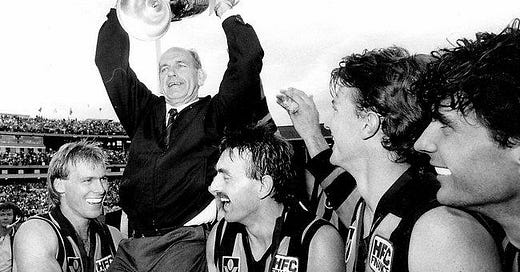



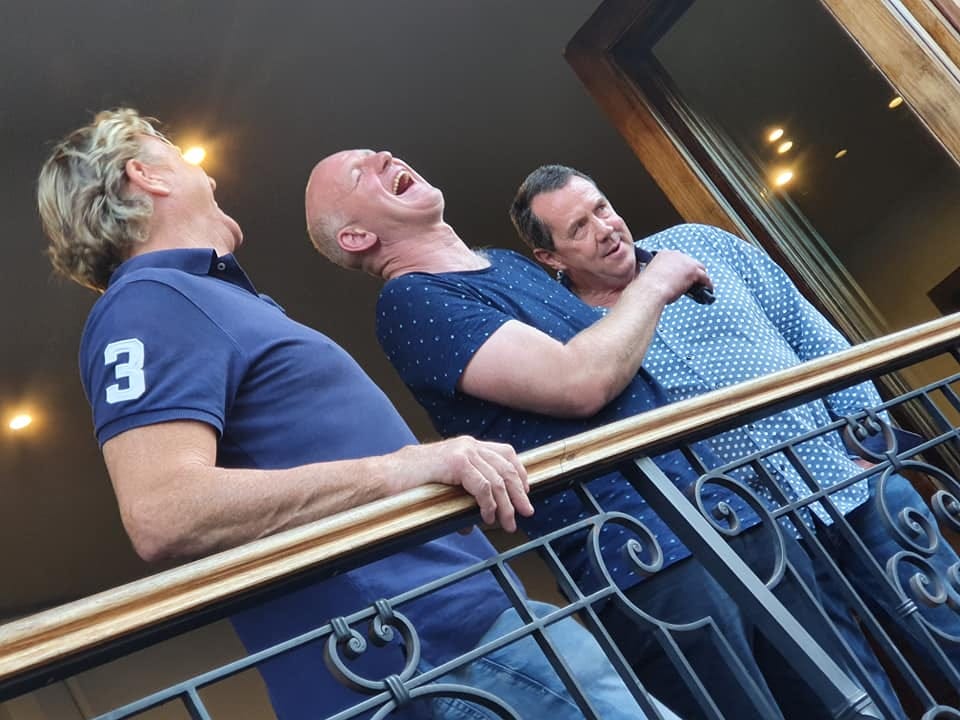

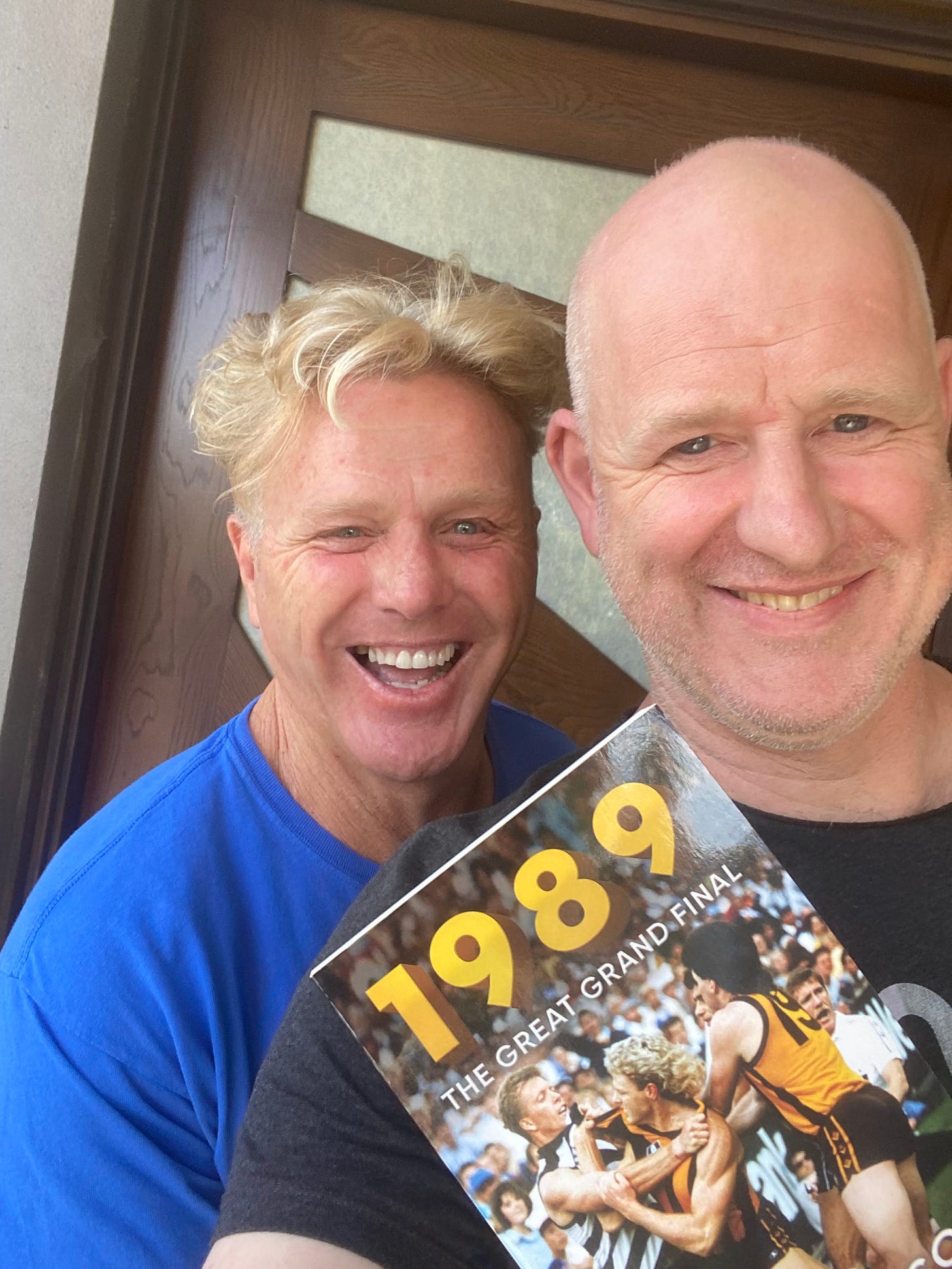
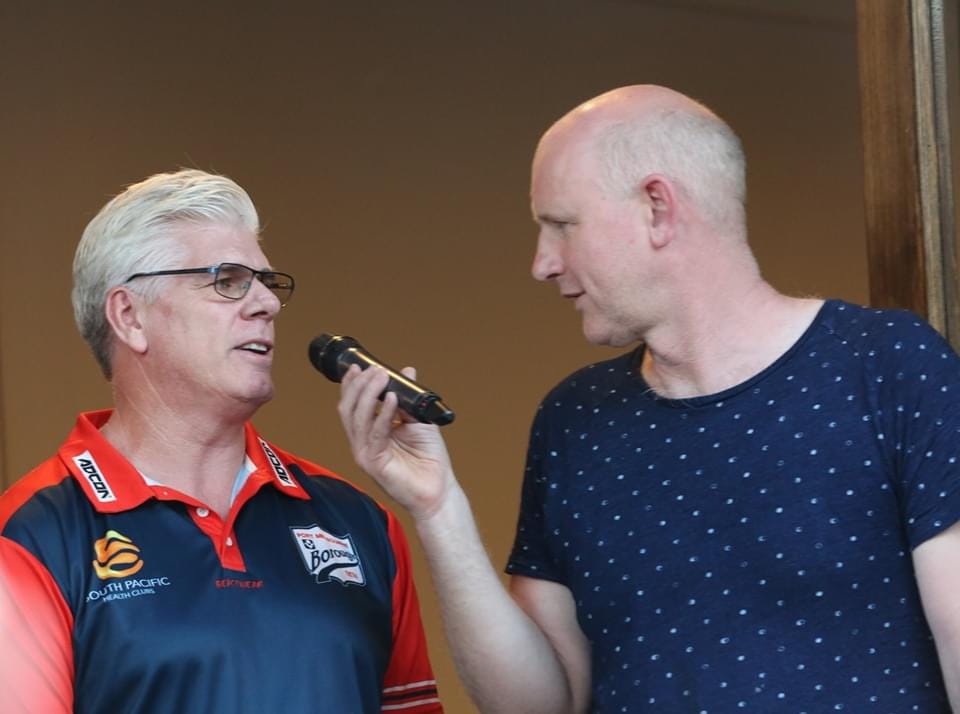
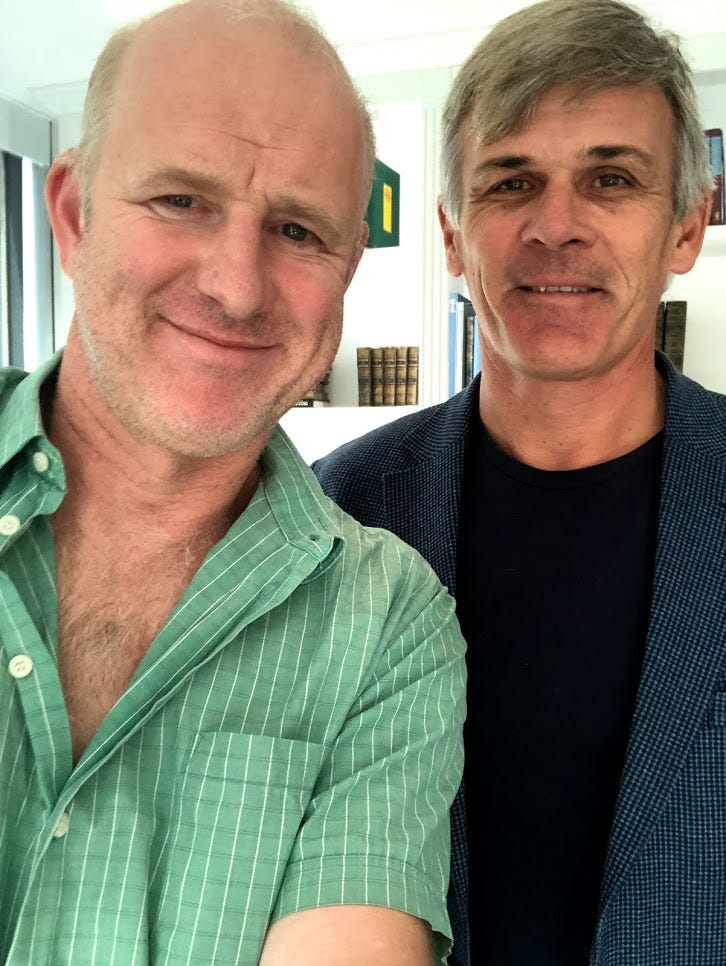


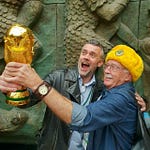

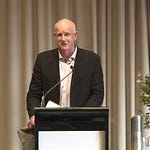
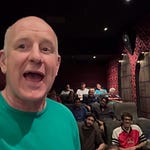




Share this post